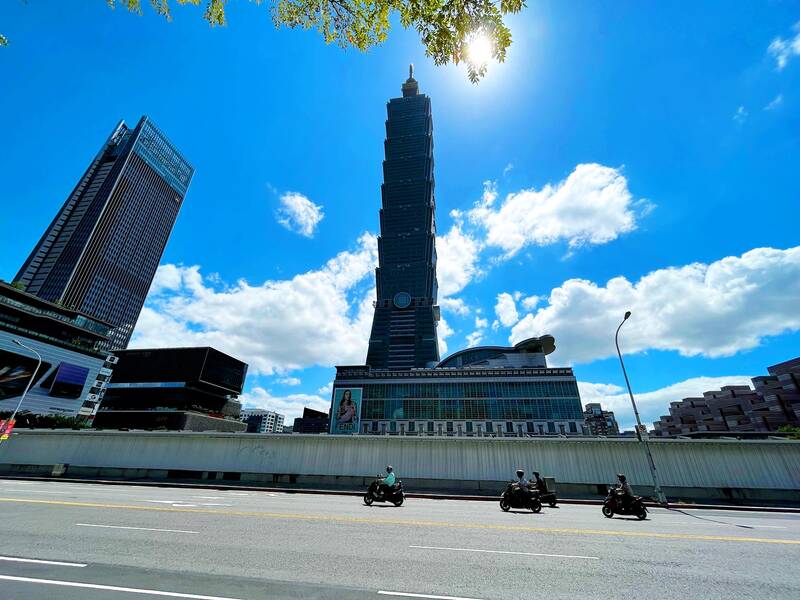The iconic Taipei 101 skyscraper has been named the property with the highest land value in the capital city for the 11th consecutive year, followed by Cathay Landmark (國泰置地廣場) and Shin Kong Life Tower (新光摩天大樓), the Taipei Department of Land Administration said on Wednesday.
Each ping (33.1m2) on the Taipei 101 plot is worth about NT$6.615 million (US$63,939), the most expensive in the city, as it is a long-standing famous landmark and home to many office buildings, the land administration said.
The Cathay Landmark, located on Zhongxiao E Road, is valued at NT$6.34 million per ping, making it the second-highest in Taipei for the first time, while Shin Kong Life Tower on Zhongxiao W Road is third at NT$6.29 million per ping.

Photo: Hsu Yi-ping, Taipei Times
The land administration said the Shin Kong Life Tower had been “the king of land” between 1990 and 2013, but that Taipei 101 has held the title since 2014.
Regarding residential buildings, the Palace Mansion (宏勝帝寶) in Daan District (大安) was assessed as having the highest land value, with each ping valued at NT$4.74 million. Ren Ai Shang Hua (仁愛尚華) and Ren Ai Lee Ching (仁愛麗景) in Xinyi District (信義), meanwhile, were placed joint-second, with each ping valued at NT$4.46 million.
The land administration said the citywide assessment was based on a survey of property transactions from Sept. 2 last year to Sept. 1. Land value in the city is estimated to have increased 0.29 percent on average over the period, it said.
The land value rose in all of the city’s 12 administrative districts except for Shilin District (士林), where it dropped, it added.

CHIP RACE: Three years of overbroad export controls drove foreign competitors to pursue their own AI chips, and ‘cost US taxpayers billions of dollars,’ Nvidia said China has figured out the US strategy for allowing it to buy Nvidia Corp’s H200s and is rejecting the artificial intelligence (AI) chip in favor of domestically developed semiconductors, White House AI adviser David Sacks said, citing news reports. US President Donald Trump on Monday said that he would allow shipments of Nvidia’s H200 chips to China, part of an administration effort backed by Sacks to challenge Chinese tech champions such as Huawei Technologies Co (華為) by bringing US competition to their home market. On Friday, Sacks signaled that he was uncertain about whether that approach would work. “They’re rejecting our chips,” Sacks

Taiwan’s long-term economic competitiveness will hinge not only on national champions like Taiwan Semiconductor Manufacturing Co. (TSMC, 台積電) but also on the widespread adoption of artificial intelligence (AI) and other emerging technologies, a US-based scholar has said. At a lecture in Taipei on Tuesday, Jeffrey Ding, assistant professor of political science at the George Washington University and author of "Technology and the Rise of Great Powers," argued that historical experience shows that general-purpose technologies (GPTs) — such as electricity, computers and now AI — shape long-term economic advantages through their diffusion across the broader economy. "What really matters is not who pioneers

In a high-security Shenzhen laboratory, Chinese scientists have built what Washington has spent years trying to prevent: a prototype of a machine capable of producing the cutting-edge semiconductor chips that power artificial intelligence (AI), smartphones and weapons central to Western military dominance, Reuters has learned. Completed early this year and undergoing testing, the prototype fills nearly an entire factory floor. It was built by a team of former engineers from Dutch semiconductor giant ASML who reverse-engineered the company’s extreme ultraviolet lithography (EUV) machines, according to two people with knowledge of the project. EUV machines sit at the heart of a technological Cold

TAIWAN VALUE CHAIN: Foxtron is to fully own Luxgen following the transaction and it plans to launch a new electric model, the Foxtron Bria, in Taiwan next year Yulon Motor Co (裕隆汽車) yesterday said that its board of directors approved the disposal of its electric vehicle (EV) unit, Luxgen Motor Co (納智捷汽車), to Foxtron Vehicle Technologies Co (鴻華先進) for NT$787.6 million (US$24.98 million). Foxtron, a half-half joint venture between Yulon affiliate Hua-Chuang Automobile Information Technical Center Co (華創車電) and Hon Hai Precision Industry Co (鴻海精密), expects to wrap up the deal in the first quarter of next year. Foxtron would fully own Luxgen following the transaction, including five car distributing companies, outlets and all employees. The deal is subject to the approval of the Fair Trade Commission, Foxtron said. “Foxtron will be